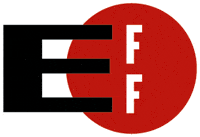Articles by Electronic Frontier Foundation (EFF)

Internet shuts down across Syria
Syria has experienced an unprecedented Internet blackout, raising concerns about the communications rights of its citizens.

Eskinder Nega and the struggle for independent media in Ethiopia
Award-winning journalist Eskinder Nega is appealing his 18-year conviction on terrorist charges. His case is emblematic of the struggle for a free press in Ethiopia.

More nations join trade agreement threatening digital rights
The next round of Trans-Pacific Partnership (TPP) agreement negotiations will take place in December in New Zealand, and it will be done with the same level of secrecy as the last 14 rounds.

Internet bill of rights threatens freedom of expression in Brazil
Brazil is now in the midst of rolling out an Internet bill of rights, called Marco Civil da Internet, which was intended to afford strong protections for freedom of online expression and Internet intermediaries. Unfortunately, last-minute changes would leave users and Internet service providers in an ocean of legal uncertainty.

New restrictions on online speech included in US legal proposition
EFF opposes California Proposition 35, which calls for new restrictions on registered sex offenders, because it would create new restrictions on online speech and increased government surveillance of the online accounts for a class of individuals, creating a dangerous legislative model for policing unpopular groups in the future.

US policy on warrantless wiretapping: has it changed?
On the “Daily Show”, Jon Stewart boldly went where no mainstream reporter has gone so far this election cycle: asking President Obama why has he embraced Bush’s wiretapping program after campaigning against it on the grounds that it violated Americans’ civil liberties.

Decision to drop charges against two Gambian journalists welcomed
MFWA welcomes the move by Gambian authorities to drop charges against two journalists for seeking permission to peacefully protest the execution of death row inmates, but calls for investigation into death threats against journalists.

Canada-EU pact replicates Anti-Counterfeiting Trade Agreement provisions
An analysis of the draft Canada-EU agreement shows it includes several of the same controversial provisions as the ACTA, specifically concerning criminal enforcement, private enforcement by Internet Service Providers and harsh damages.
